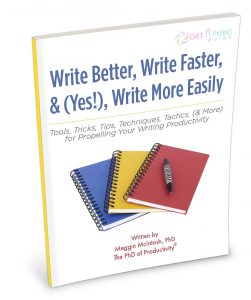What I’ve Learned about Dissertation Writing from Mentors and Colleagues by Breea C. Willingham
 Mark Twain once said, “If you’re going through hell, keep going.” I am convinced he was referring to the dissertation. What else would you call long nights of writing and no sleep mixed with bouts of anxiety, depression, and self-doubt? Despite this hellacious process, the dissertation writer must forge ahead, but how? Below is a list of writing advice from my mentors and colleagues that I often refer to when I need a dose of “keep going” to get through my dissertation hell.
Mark Twain once said, “If you’re going through hell, keep going.” I am convinced he was referring to the dissertation. What else would you call long nights of writing and no sleep mixed with bouts of anxiety, depression, and self-doubt? Despite this hellacious process, the dissertation writer must forge ahead, but how? Below is a list of writing advice from my mentors and colleagues that I often refer to when I need a dose of “keep going” to get through my dissertation hell.
-
Don’t look at the end. Focus on the planned steps and conquer them one by one. Focusing on the end and not the means will only overwhelm you and impede your progress.
-
Trust your inner brilliance. One of my mentors reminds me of this whenever I get down about my writing or start doubting myself. My translation: Tell your inner-critic to shut up. There is no room for self-doubt in dissertation writing.
-
Give the dissertation only as much attention, energy, and angst that it deserves then go have some wine and laugh with friends. You can substitute wine for your vice of choice as long as you remember that taking breaks is just as important to the writing process as the writing itself. Your mind and body need time to regroup. And, as my mother often reminds me, even a machine needs time to recharge.
-
Stop counting pages and just write. Any distraction, no matter how big or small, can throw you off your writing game. One of my downfalls is I constantly check the page count each time I write a sentence. It was driving me crazy, so I taped a piece of paper over the page count on my laptop screen and deleted the page numbers from the Word document. I still have the urge to peak, but instead of taking the time to peel back the tape, I keep writing.
-
The best way out of this is pushing through. Just. Keep. Going.
-
Imagine it as the dross that is tossed in the fire in order to retrieve the gold. An eloquent piece of advice from a colleague during a recent pep talk. No explanation necessary.
-
Quit indulging your writer’s ego. For now, just slam it out. Edit later. As a former newspaper reporter, it’s hard for me to write without editing. However, as one of my mentors recently reminded me, that style doesn’t fit with dissertation writing. Editing while writing is counterproductive and only prolongs the writing process. Stop it. Leave the editing for the revision process.
-
You have to get comfortable in your own mess. A former professor of mine told me this when I was analyzing my data, but it also applies to writing. Make a beautiful mess of your writing. Wallow in it. Get comfortable in it like it’s your old favorite, worn-out sweatshirt. Once you get comfortable, the writing won’t be so intimidating.
-
If you look at your writing and swear it’s the worst thing you’ve ever written, keep writing anyway. This advice comes from me. Bad writing is still writing; it leaves you something to edit. Besides, it’s probably not as bad as you think.
-
If you need to have a meltdown, have a meltdown. This advice is also from yours truly. After my most recent crying fit, I’ve learned that meltdowns are a necessary part of the dissertation writing process. There is something oddly comforting about breaking down, then building yourself back up. A meltdown is a good way to cleanse your writing soul.
I hope these tips will help you get through those difficult dissertation days. Remember, if writing a dissertation were easy everyone would be doing it.
Breea C. Willingham is a doctoral candidate in American Studies at SUNY Buffalo. She is writing her dissertation on the experiences of instructors teaching in women’s prisons. She can be reached via e-mail at bcw2@buffalo.edu or Twitter at @writeonsister13.
 Whether you write for pleasure, to discover, to get paid, as a part of your work, as a way to instruct, or for any other purpose, streamlining your writing process is essential. The Get a Plan! Guide® to Writing Better, Faster, & (Yes!) More Easily: Tools, Tricks, Tips, Techniques, Tactics, & More for Propelling Your Writing Productivity.
Whether you write for pleasure, to discover, to get paid, as a part of your work, as a way to instruct, or for any other purpose, streamlining your writing process is essential. The Get a Plan! Guide® to Writing Better, Faster, & (Yes!) More Easily: Tools, Tricks, Tips, Techniques, Tactics, & More for Propelling Your Writing Productivity.
Inside this essential Get a Plan! Guide, you’ll find nearly 70 practical, easy-to-implement ideas that will propel your writing productivity.




